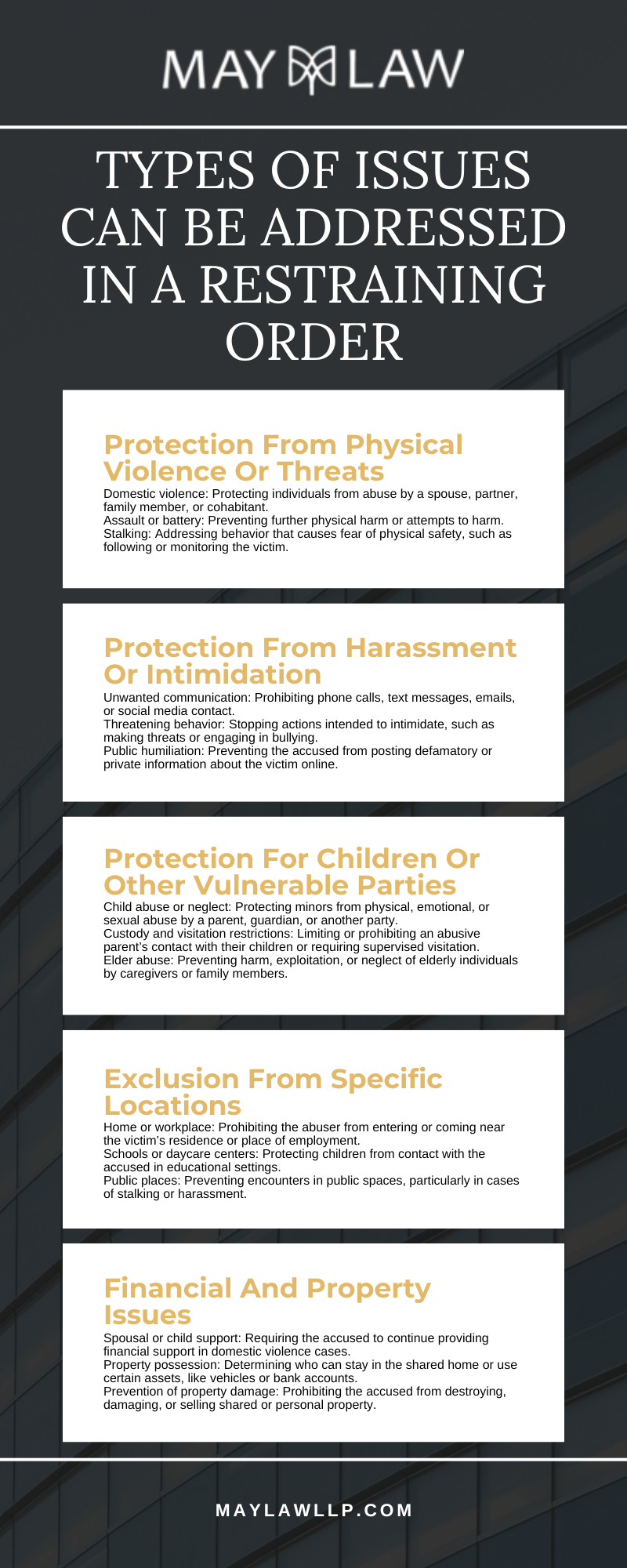Restraining Order Petition Lawyer Fairfax, VA
Fairfax, Virginia Restraining Order Petition Lawyer
 If you are in need of a Fairfax, VA restraining order petition lawyer look to May Law, LLP for help. A restraining order should not be taken lightly, so if you have learned that there is one against you, finding a lawyer who is skilled at criminal law should be a top priority. We can assess your situation and educate you about your rights. We can determine if the order is warranted and build a defense for you. If you believe that someone has filed an unwarranted restraining order against you, consult with our lawyer today to receive prompt legal counsel. Having helped clients since 1995, we understand the stress that comes with dealing with a difficult legal situation and know what it takes to achieve the best results.
If you are in need of a Fairfax, VA restraining order petition lawyer look to May Law, LLP for help. A restraining order should not be taken lightly, so if you have learned that there is one against you, finding a lawyer who is skilled at criminal law should be a top priority. We can assess your situation and educate you about your rights. We can determine if the order is warranted and build a defense for you. If you believe that someone has filed an unwarranted restraining order against you, consult with our lawyer today to receive prompt legal counsel. Having helped clients since 1995, we understand the stress that comes with dealing with a difficult legal situation and know what it takes to achieve the best results.
Restraining Order Petition Lawyer in Fairfax VA
The satisfaction and protection of our clients’ rights is our main focus at May Law, LLP. We approach each case with care, giving our clients the attention they deserve. Everyone has the right to proper legal representation, and our skilled and experienced legal team will use their resources to make sure that you are supported along the way. Schedule an initial consultation today to speak to our qualified lawyer who can stand by your side and be a fierce advocate for you.
Understanding Restraining Orders
A restraining order is a document ordered by the court that forbids a named individual from doing certain things, such as contacting or coming within an established distance near the individual who requested the restraining order. They also go by the name of protective orders. They are commonly issued following domestic violence incidents or cases that involve stalkers.
If a court has determined that a restraining order is appropriate, it is important to obey it right away. Restraining orders can be temporary or permanent and there are many consequences to this legal order. For example, if you and the petitioner have a child together and your child does not live with you, your visitation rights may be affected.
What to Do If There is a Restraining Order Against You
Do not dismiss any notice of a restraining order. Make sure to attend the mandatory hearing where the judge will hear your defense, otherwise you can risk damaging your case. Domestic violence laws vary across different states, so it is essential to contact our lawyer for a clearer understanding of how laws apply to your situation. We can go over the most effective legal strategies and action steps you can take. For more specific guidance on how to respond to a restraining order filed against you talk to our lawyer.
How A Restraining Order Helps
A restraining order tells someone to not hurt you, threaten to hurt you, or stalk you. This includes hitting, pushing, kicking, biting, scratching, or anything else that hurts you. Our Fairfax, VA restraining order petition lawyer can help you with all your restraining order petitions.
In certain situations, you can also ask the court to order that specific belongings or document be given to you, such as:
- a vehicle
- a checkbook
- insurance documents or
- a document you need to prove your identity, such as an ID or passport
You can also ask the court to order the other person to
- pay the rent or mortgage on the home
- pay for utilities for the home
- provide financial support for the children
- not shut off utilities for the home
- not change or cancel health, auto, or homeowner’s insurance and
- not sell, hide, or get rid of property that you own or lease
These orders are called Orders of Maintenance, and you can ask for them if the other person is your spouse or if they are the parent of your minor child and you all live together.
Orders of Maintenance expire 120 days from when they were issued or when a judge enters new orders to replace them.
What To Expect At a Restraining Order Hearing
The process varies depending on if all parties are present at the courthouse.
The court will ask you and the other person to meet with a Family Relations Counselor first. The counselor will suggest a way to make an agreement about your case instead of having a hearing. You don’t have to accept the counselor’s suggestion.
If the restraining order signed by the judge orders no contact between you and the other person or if you are afraid, you should tell one of the courthouse marshals. Our Fairfax restraining order petition attorney is professionally qualified to handle your case and can help you as you go through the procedure. You do not have to feel like you are alone. We are here for you.
If you and the other person can reach an agreement, the hearing may have a different result.
The Family Relations Counselor will put the agreement in writing and give it to the judge after both of you have signed it. Then the judge will ask you and the other person questions like these:
- Is this your agreement?
- Did you read it?
- Do you understand it?
- Did you sign it?
- Did anyone force you to agree to this?
- Do you think this agreement is fair, under all the circumstances?
- Do you think this agreement is in the best interest of your child/children?
- Do you want me to make your agreement a court order?
If the other person is not at the hearing or you cannot come to an agreement, wait in the courtroom until the judge calls your name. You will have a hearing, and the judge will decide your case.
Consulting our legal team will enable you to be at ease as you go through this procedure. Contact us today. At May Law, LLP, we care for you.
Fairfax Restraining Order Petition Statistics
According to national statistics, there are more than 1 million permanent restraining orders issued each year. Between 2 to 3 million temporary restraining orders are served each year.
Please call our office today for a confidential consultation to find out how we can help obtain protection for you and your family.
Restraining Order Petition RAQs
How can a Fairfax, VA Restraining Order Petition Lawyer Assist Me in Obtaining a Restraining Order?
Our lawyer will serve as your advocate when seeking a restraining order. We will guide you through the process, help you complete the necessary paperwork, and represent your interests in court. Our experience and legal knowledge can significantly increase your chances of obtaining the protection you need.
What Criteria Must Be Met To Obtain a Restraining Order in Fairfax, VA?
To obtain a restraining order in Fairfax, certain criteria must be met. You need to demonstrate that you have a legitimate reason for seeking protection, such as being a victim of harassment, threats, or abuse. Our legal team will work with you to gather the necessary evidence and make sure that your case aligns with the legal requirements.
Can a Lawyer Help Me If Someone Has Filed a Restraining Order Against Me?
Absolutely. If someone has filed a restraining order against you, it’s vital to seek legal representation promptly. A restraining order defense attorney can help you prepare a strong defense, gather evidence, and present your case in court to challenge the allegations and protect your rights.
What Happens If a Restraining Order is Violated in Fairfax, VA?
Violating a restraining order in Fairfax is a serious offense. If you violate the terms of a protective order, you may face legal consequences, including fines and even imprisonment. It’s essential to have our lawyer who can advise you on complying with the order and defending you if you are falsely accused of a violation.
How Do I Choose the Right Lawyer For My Case?
Selecting the right lawyer is vital. Look for a lawyer who has experience handling similar cases, understands the local legal system, and has a track record of successful outcomes. Schedule consultations with potential lawyers to assess their experience and determine who you feel most comfortable working with to protect your interests.
When it comes to restraining orders in Fairfax, VA, having the right legal representation is essential. Our team at May Law, LLP is here to provide you with the expert guidance and support you need. Whether you’re seeking a restraining order or defending against one, our firm is ready to stand by your side.
Don’t wait – contact us today for a consultation with our experienced lawyer. Let us help you handle the challenging elements of restraining order petitions and protect your well-being.
Your safety and peace of mind matter. Reach out to us now to schedule a consultation with our trusted Fairfax restraining order petition lawyer. We are committed to securing your rights and providing you with the legal support you deserve.
Fairfax Restraining Order Petition Infographic

Types Of Issues A Restraining Order Can Address
If you are having domestic issues with a partner, former partner, or other family member, our Fairfax, VA restraining order petition lawyer can help you take the steps to protect you and your family. Restraining orders, also known as protective orders, are legal tools designed to protect individuals from harm or threats of harm by another person. Courts issue them and can impose specific restrictions on the accused party to prevent further abuse, harassment, or danger. Restraining orders address various issues, depending on the nature of the case and the type of criminal protective order sought. If you would like to learn more about how a restraining order can help your situation, call our firm today.
Protection From Physical Violence Or Threats
One of the primary purposes of a restraining order is to shield victims from physical violence or the threat of violence. These orders are often sought in cases of:
- Domestic violence: Protecting individuals from abuse by a spouse, partner, family member, or cohabitant.
- Assault or battery: Preventing further physical harm or attempts to harm.
- Stalking: Addressing behavior that causes fear of physical safety, such as following or monitoring the victim.
A restraining order can prohibit the abuser from contacting or approaching the victim, securing their physical safety. In some cases, the court may order the accused to surrender weapons or firearms to reduce the risk of violence.
Protection From Harassment Or Intimidation
Restraining orders can also address non-physical forms of harm, such as harassment, intimidation, or emotional abuse. This includes:
- Unwanted communication: Prohibiting phone calls, text messages, emails, or social media contact.
- Threatening behavior: Stopping actions intended to intimidate, such as making threats or engaging in bullying.
- Public humiliation: Preventing the accused from posting defamatory or private information about the victim online.
These measures are particularly important in cases involving stalking, workplace harassment, or abusive relationships where the victim feels unsafe even without physical violence.
Protection For Children Or Other Vulnerable Parties
Courts frequently issue restraining orders to protect children, elderly individuals, or other vulnerable parties from harm. This includes situations involving child abuse or neglect, where a restraining order may be used to protect minors from physical, emotional, or sexual abuse by a parent, guardian, or another party. In cases of custody and visitation restrictions, a restraining order can limit or prohibit an abusive parent’s contact with their children or require supervised visitation. Additionally, restraining orders are often issued to prevent elder abuse, protecting elderly individuals from harm, exploitation, or neglect by caregivers or family members.
Restraining orders in these cases often include provisions to secure the safety and well-being of the vulnerable party, such as requiring the accused to stay away from schools, daycare centers, or assisted living facilities.
Exclusion From Specific Locations
Restraining orders often address issues of physical proximity by requiring the accused to stay away from certain places frequented by the victim. These may include:
- Home or workplace: Prohibiting the abuser from entering or coming near the victim’s residence or place of employment.
- Schools or daycare centers: Protecting children from contact with the accused in educational settings.
- Public places: Preventing encounters in public spaces, particularly in cases of stalking or harassment.
In some situations, restraining orders may establish a minimum distance the accused must maintain, such as staying at least 100 yards away from the victim.
Financial And Property Issues
Our Fairfax restraining order petition attorney can assist you with more than just physical threats. Restraining orders can also address financial matters and property-related issues. For instance, they may require the accused to continue providing spousal or child support in domestic violence cases. Additionally, a restraining order may determine who can remain in the shared home or use specific assets, such as vehicles or bank accounts. It can also include provisions to prevent property damage, prohibiting the accused from destroying, damaging, or selling shared or personal property.
These provisions aim to protect the victim’s financial stability and prevent the accused from using property as a form of control or retaliation.
Temporary Orders For Counseling Or Treatment
In some cases, courts may include provisions in a restraining order requiring the accused to seek counseling, therapy, or treatment for underlying issues. These provisions may address anger management to help control violent or abusive behavior, substance abuse treatment to mandate rehabilitation for individuals whose behavior is influenced by drugs or alcohol, or mental health counseling to make sure that the accused receives appropriate support to prevent further harm. These orders are often issued alongside other restrictions to address the root causes of harmful behavior and promote long-term change.
Fairfax Restraining Order Petition Infographic


Fairfax Restraining Order Petition Glossary
If you are seeking restraining order petition lawyers in Fairfax, VA, we understand that you may be dealing with a challenging and emotional time. At May Law, LLP, our experienced attorneys are committed to providing strong and professional legal representation to help you through this process. With decades of experience serving clients throughout Northern Virginia, we are here to support you every step of the way.
Restraining Order
A restraining order is a court-issued legal directive intended to protect individuals from threats, harassment, or abuse. It often applies in situations involving domestic violence, stalking, or other forms of personal harm. In Fairfax, Virginia, there are several types of restraining orders, including emergency, preliminary, and permanent orders. Each type has specific requirements and protections tailored to the unique needs of the petitioner.
Protective Orders
Protective orders are a specific type of restraining order issued to prevent continued harm or harassment. In Virginia, protective orders are categorized into three types: emergency protective orders, preliminary protective orders, and permanent protective orders. Each type serves different purposes and durations. For instance, an emergency protective order might be issued immediately after a domestic dispute, lasting up to 72 hours, while a permanent protective order can last up to two years or longer. If someone has filed for a protective order against you, we can help you understand the restrictions and build a strong defense.
Filing Requirements
To petition for a restraining order, you must provide sufficient evidence demonstrating the need for protection. This often includes documentation of harassment, threats, or physical abuse. In cases where evidence might not be immediately available, testimony and sworn affidavits can serve as critical components. Our attorneys have helped clients prepare strong petitions by focusing on the specific details needed to meet these legal thresholds.
Standard Of Proof
In restraining order cases, the petitioner must meet a certain standard of proof to obtain the court’s protection. While this standard is not as rigorous as “beyond a reasonable doubt,” it does require clear and convincing evidence that the respondent poses a threat to the petitioner. This can involve corroborating testimony, law enforcement reports, or documented communications.
Procedural Safeguards
Courts in Fairfax, Virginia, adhere to strict procedural rules to create fairness for both parties involved. Procedural errors, such as failing to notify the respondent properly or mishandling evidence, can jeopardize a restraining order case. Our attorneys are vigilant in identifying these issues, helping to preserve your rights and strengthen your case.
Types Of Abuse Covered
Restraining orders can address various forms of abuse, including physical violence, emotional intimidation, stalking, and threats of harm. They can also extend to protecting children, family members, and even pets in some situations. These orders are vital tools in creating a safe environment for domestic violence victims, and our lawyers approach each case with the utmost care and diligence.
Orders Of Maintenance
Orders of maintenance are specific provisions within a restraining order that address financial and property-related issues. These orders can require the accused to pay bills, maintain utility services, or continue financial support for a shared household. For example, if a couple with children separates due to domestic violence, the court may order one parent to cover the mortgage or child-related expenses. These orders typically last 120 days unless replaced by new court orders. Our lawyers can advocate for you to include or challenge such provisions in your case.
Court Hearing Procedures
The court hearing process for restraining orders involves several critical steps, including presenting evidence, responding to the petitioner’s claims, and, if applicable, negotiating agreements through a Family Relations Counselor. For example, in some cases, the judge may require both parties to attempt a mediated resolution before proceeding to a full hearing. If mediation fails, the judge will hear the evidence and issue a decision. Failing to attend a restraining order hearing can result in severe consequences, such as losing the opportunity to present your defense. We guide our clients through every stage of the hearing process to protect their interests.
Consequences Of Violating A Restraining Order
Violating a restraining order is a serious offense in Virginia and can lead to criminal charges. Consequences may include fines, jail time, or additional legal restrictions. If you have been issued a restraining order or are accused of violating one, it is essential to seek legal guidance from our criminal defense attorney immediately to protect your rights.
Comprehensive Legal Support
At May Law, LLP, we’ve been serving clients in Fairfax, Arlington, Prince William, and beyond since 1995. Our practice encompasses a range of legal areas, including criminal law, family law, and civil litigation. This broad experience allows us to approach restraining order cases with an in-depth understanding of the law and a commitment to achieving the best possible outcomes for our clients.
We believe in providing clear communication and thorough legal advice to empower our clients. Whether you need help filing a petition or defending against a false protective order, our lawyers are prepared to provide the guidance and representation you need.
If you or someone you know needs assistance with a restraining order petition in Fairfax, VA, contact our firm today. Let us help you take the next steps toward safety and peace of mind.

May Law, LLP, Fairfax Restraining Order Petition Lawyer
3900 University Drive, Suite 120, Fairfax, Virginia 22030
Call Our Law Firm For Legal Assistance
Restraining orders are powerful legal tools that address a wide range of issues, from physical violence and harassment to financial disputes and child protection. Whether dealing with domestic violence, stalking, or workplace harassment, seeking a restraining order can provide a critical layer of protection and accountability. Working with our Fairfax restraining order petition lawyer can make sure that the restraining order is tailored to address the specific concerns of the case, offering comprehensive security for those in need. Contact May Law, LLP to find out what legal options you may have. Our legal team is committed to fighting to protect your rights, family, and freedom. Whether you want to file a restraining order or defend against false accusations, we are here to help. Get started by scheduling a consultation today.